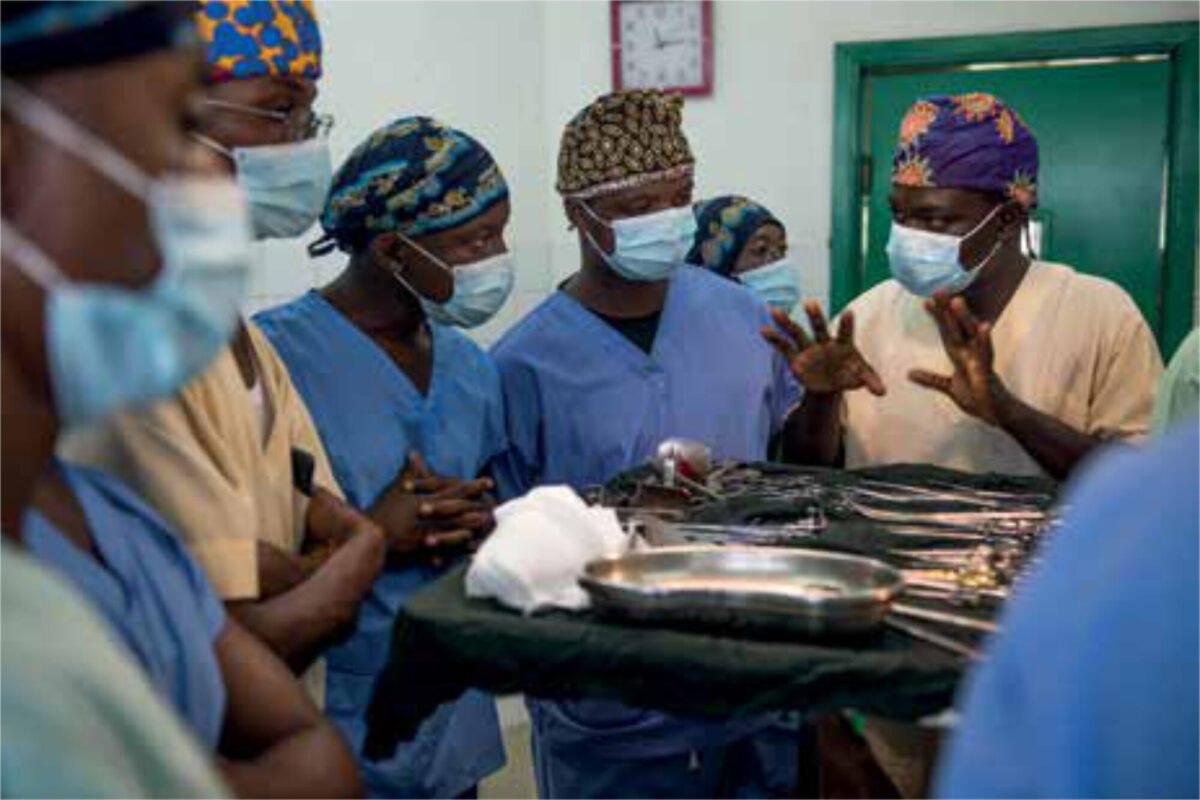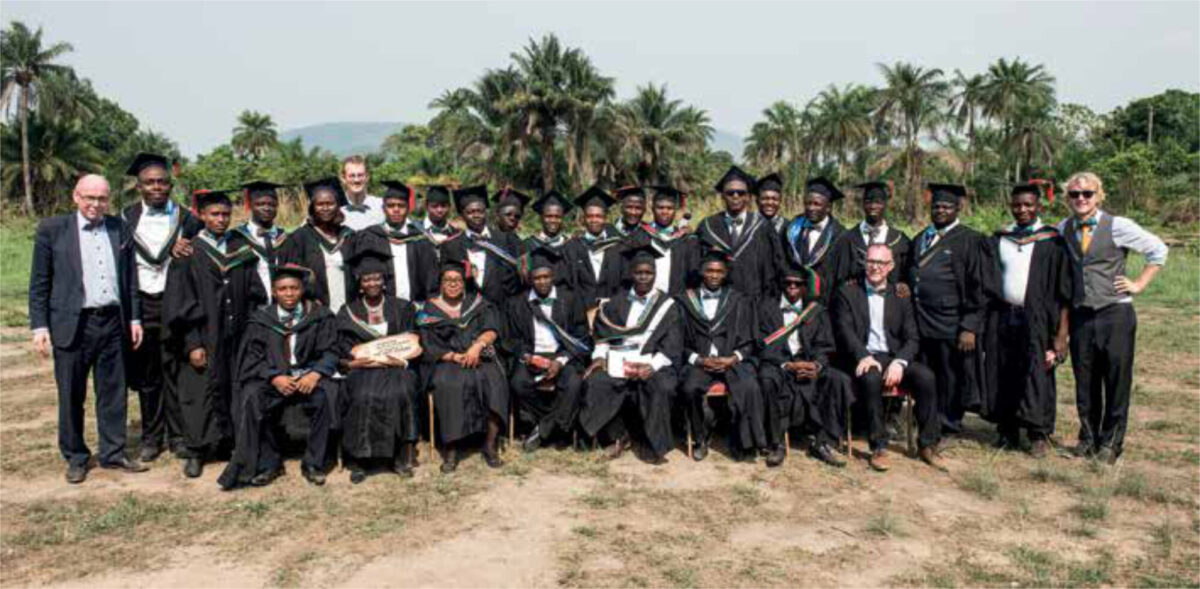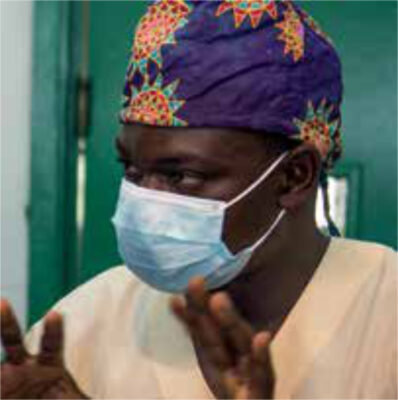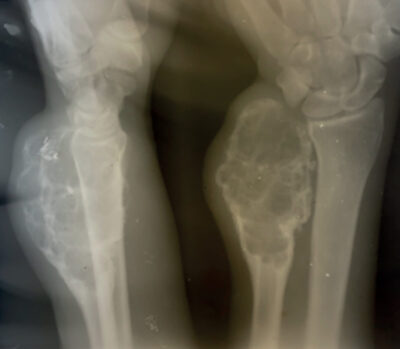Main content
CapaCare is an international non-governmental organisation established in 2011, currently registered in Sierra Leone, the Netherlands and Norway. Its main programme to date has been to strengthen surgical care in Sierra Leone. This West African country has some of the poorest health indicators globally, such as 717 maternal deaths per 100,000 live births and an unmet surgical need of 91%.[1,2] Reasons for these grim health statistics include shortage of surgical professionals with adequate skills.[3] CapaCare aims to strengthen the healthcare system through medical education in the Surgical Training Programme (STP).[4] The STP is a task-sharing programme training community health workers in life-saving general and obstetrical surgery. The programme is hospital based, and the students go through four different clinical rotations of six months each and follow fulltime training modules in surgery, obstetrics, sonography, traumatology, and urology in between their rotations. Close collaboration with the Ministry of Health and Sanitation (MoHS) since the start has been vital to ensure that graduates are incorporated into the national healthcare system as surgical assisting community health officers (SACHOS).[5]

The training programme
In the past ten years, 106 students enrolled in the STP of whom 52 have graduated as SACHO. Also 106 students enrolled in the STP of whom 52 have graduated as SACHO. They work in 25 different hospitals across the country, close to three quarters of these are government facilities, and close to 80% are based in rural areas. In December 2020, 32 students were still in training. All students start the training in the same private partner hospital. After six months, they continue their training by doing various rotations in some of the thirteen affiliated hospitals, a mixture of both governmental and private institutions. The shift of training sites from private to governmental hospitals has been a deliberate decision to develop competencies and adequate supervision within the MoHS hospitals.
The curriculum was developed from the World Health Organization’s (WHO) Emergency and Essential Surgical Care (EESC) programme, which aimed to address the lack of adequate surgical capacity as a global public health issue. In particular, the book Surgical Care at the District Hospital served as a content guide.[6] Over the years, additional materials and courses have been developed, including digital study material. A good example is a freely available e-book on bowel anastomosis, which has been developed together with the Dutch company MLX.[7]
All students and graduates are requested to record their surgical procedures in a logbook.[6] This allows CapaCare to follow students’ individual development, evaluate the programme, report to donors and to advocate the need for regulation, remuneration and recognition of the new surgical cadre developed within the country towards stakeholders.[8] Since the start of the programme, a total of 61,740 procedures have been recorded, of which 47,772 (77%) were performed by trainees and 13,968 (23%) by graduates. Half (50%) of the procedures are in general surgery, followed by obstetrics (46%) and orthopaedics/trauma (4%). The latest internal survey conducted in 2017 in all hospitals offering surgery in Sierra Leone showed an annual number of 27,928 operations performed by the graduates of this programme.[9-11]
The development of the STP would not have been possible without the involvement of seventeen Dutch medical doctors global health and tropical medicine (tropical doctors) over the years, who have been involved in the design, training, organisation and guardianship of the programme.[14] Their understanding of low-resource health settings and intercultural communication along with their medical technical skills and knowledge made them of great value for the students and graduates. Their presence in Sierra Leone was a constant factor during the past 10 years, and contributed to a solid collaboration with the MoHS and other partners.
Collaboration with the Ministry of Health and Sanitation
Involvement of and collaboration with the MoHS have been undisputable and a core value for CapaCare from its onset. However, as an initially unknown small start-up without any track-record, it was challenging to seize the attention of the right people at the national level. Furthermore, task-sharing was and still is controversial as surgical programmes were not part of any governmental strategy, and the surgical community in Sierra Leone is sceptical towards opening up training for non-doctors. In the early days, the meetings in the ministry did not lead to any tangible progress. Therefore, in 2010, CapaCare decided to propose a small pilot to the MoHS as a means to test their concept of the three-year diploma training.
Crucial to the establishment of the programme was the endorsement by key persons, such as the director of training within the MoHS and the Minister of Health and Sanitation. They have advocated task-sharing to strengthen emergency health services and as a means of expanding the number of skilled health personnel at the district level. The improvement of the poor maternal health statistics was key on the national agenda. With their help and permission, a memorandum of understanding was signed and the programme of CapaCare was able to scale up.

National engagement in the programme
CapaCare meaningfully engages with both the MoHS and the key actors among surgeons and obstetricians in Sierra Leone. Therefore, a broad range of collaborating partners are involved in crucial steps of the programme. Sierra Leonean doctors and surgeons work as trainers and supervisors at the partner hospitals and act as mentors during the one-year traineeships in tertiary governmental hospitals. Selection of candidates for training and examination of the students is done in joint collaboration with local health providers and representatives of the MoHS. The chief medical officer of the MoHS signs the diploma awarded upon completion of the training. Strong involvement of the MoHS in our training programme has been expanded gradually over the years. Unfortunately, SACHOs have still not been officially recognised and regulated as new health professionals by the MoHS. Part of the reason is the fact that community health workers – a profession that most graduates have as background – have not been legislated and regulated since the start in the early 1980s.[12] Consequently, the official legal establishment of the SACHO as a new profession is challenging and suffering from delays.
As a result, many SACHOs working in governmental hospitals are not included in the national payrolls, which also often happens to other health workers in Sierra Leone. Although their determination to remain active as surgical providers is often rooted in personal experiences of losses of close family members rather than status and salary, this clearly demotivates the affected graduates.[13] It makes them feel unrecognised, undervalued and unsafe in their working environment. In dialogues with the MoHS, CapaCare has advocated for the legal recognition of SACHOS, as we believe it is a crucial step in keeping the graduates motivated. In this context, the establishment of a student union in 2015, which is creating ongoing advocacy for SACHOs and trainees, has been welcomed by CapaCare.
Future plans
CapaCare is currently developing a post-training package to engage graduates as trainers for the STP. Together with increased involvement of other Sierra Leonean trainers, the programme will be less dependent on international consultants. In order to make the programme sustainable in the long run, CapaCare has started a collaboration with a training institution in Makeni (the northern provincial capital), under the responsibility of the MoHS. The collaboration focusses on developing local Sierra Leonean trainers and further embedding the programme within the country. In collaboration with the MoHS, CapaCare eventually plans to step back in favour of local ownership and sustainability.
This year CapaCare is celebrating its tenth anniversary: a moment to reflect and to look forward. From an organisational perspective, CapaCare has grown professionally; although this has been challenging, there are well-established relationships with local and national partners. These partners aim for the same goal: serving the health needs of the local population. These joint efforts enable CapaCare to look positively forward and to continue developing its programme. It is our belief that task-sharing is critical in building capacity for surgical care in low- and middle-resource settings such as Sierra Leone.
Task-shifting versus task-sharing
‘Task-shifting’ is defined by the WHO as the rational re-distribution of tasks among health workers in order to make the most efficient use of the existing workforce.[15] ‘Task-sharing’, is based on the division of tasks within a team, whereas task-shifting is more focused on individual skills.[16] A team-based approach is essential throughout the entire STP programme, and it is therefore a task-sharing training programme.

References
- Statistics Sierra Leone (Stats SL) and ICF. Sierra Leone Demographic and Health Survey 2019. Freetown, Rockville: Stats SL and ICF; 2020. 647 р.
- Bolkan HA, Hagander L, Von Schreeb J, et al. The surgical workforce and surgical provider productivity in Sierra Leone: a countrywide inventory. World J Surg. 2016 Jun;40(6):1344-51. doi: 10.1007/s00268-016-3417-1
- Bergström S, McPake B, Pereira C, et al. Workforce innovations to expand the capacity for surgical services. In: Debas HT, Donkor P, editors. Essentia surgery: disease control priorities, Third Edition (Volume 1). Washington: The International Bank for Reconstruction and Development/The World Bank, 2015; p. 307-16
- Bolkan HA, Van Duinen AJ, Waalewijn B, et al. Safety, productivity and predicted contribution of a surgical task-sharing programme in Sierra Leone. Br J Surg. 2017 Sep;104(10):1315-26. doi: 10.1002/bjs.10552
- Van Duinen AJ, Waalewijn B, B Ystgaard B, et al. Strengthening of the Sierra Leonean health system by implementing a surgical task shifting programme. MTb. 2014 Dec;52(4):20-2
- World Health Organization. Surgical Care at the District Hospital [Internet]. Geneva: World Health Organization; 2003. 514 p. Available from: https://www.who.int/surgery/publications/en/SCDH.pdf
- MLX [Internet]. Amsterdam: MLX. Available from: https://mlx.amsterdam/
- Svendsen ØV, Helgerud C, Van Duinen AJ, et al. Evaluation of a surgical task sharing training programme’s logbook system in Sierra Leone. BMC Med Educ. 2019 Jun 11;19(1):198. doi: 10.1186/$12909-019-1647-2
- Waalewijn BP, Van Duinen A, Koroma AP, et al. Learning curve characteristics for caesarean section among associate clinicians: a prospective study from Sierra Leone. World J Surg. 2017 Dec;41(12):2998-3005. doi: 10.1007/s00268-017-4202-5
- Lindheim-Minde B, et al. Changes in surgical volume, workforce and productivity in Sierra Leone between 2012 and 2017. Unpublished.
- Bolkan HA, Van Duinen A, Samai M, et al. Admissions and surgery as indicators of hospital functions in Sierra Leone during the west-African Ebola outbreak. BMC Health Serv Res. 2018 Nov 9;18(1):846. doi: 10.1186/s12913-018-3666-9
- Swiss-Sierra Leone Development Foundation [Internet]. Makeni, Geneva. Nationwide strike by community health officers; 2017 Sep 19. Available from: http://ssldf.org/nationwide-strike-by-community-health-officers/
- Mansaray A. To learn from each other. In: Hummelen M, Botman M. Into the world, experiences and views of medical doctors Global Health and Tropical Medicine. I st ed. Arnhem: Boekschap; 2017. p. 82
- Koninklijke Nederlandsche Maatschappij tot bevordering der Geneeskunst [Internet]. Utrecht: KNMG; 2021. Internationale Gezondheidszorg en Tropengeneeskunde; 2021. Available from: https://www.knmg.nl/opleiding-herregistratie-carriere/geneeskundestudie/overzicht-opleidingen-1/internationale-gezondheidszorg-en-tropengeneeskunde.htm
- World Health Organization, PEPFAR, UNAIDS. Task shifting: rational redistribution of tasks among health workforce teams: global recommendations and guidelines [Internet]. Geneva: World Health Organization; 2008. 88 p. Available from: https://apps.who.int/iris/bitstream/handle/10665/43821/9789241596312_eng.pdf?sequence=1&isAllowed=y
- Smith M. Is task sharing preferred to task shifting in the provision of safe surgical care? Surgery. 2018 Sep;164(3):559-60. doi: 10.1016/j.surg. 2018.05.005. Epub 2018 Jun 19. PMID: 29929758



















































